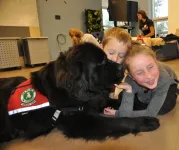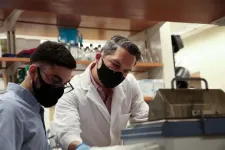(Press-News.org) A new UBC Okanagan study finds children not only reap the benefits of working with therapy dogs-they enjoy it too.
"Dog lovers often have an assumption that canine-assisted interventions are going to be effective because other people are going to love dogs," says Nicole Harris, who conducted this research while a master's student in the School of Education. "While we do frequently see children improve in therapy dog programs, we didn't have data to support that they enjoyed the time as well."
Harris was the lead researcher in the study that explored how children reacted while participating in a social skill-training program with therapy dogs.
The research saw 22 children from the Okanagan Boys and Girls Club take part in a series of sessions to help them build their social skills. Over six weeks, the children were accompanied by therapy dogs from UBC Okanagan's Building Academic Retention through K9s (BARK) program as they completed lessons.
Each week the children were taught a new skill, such as introducing themselves or giving directions to others. The children would first practice with their assigned therapy dog before running through the exercise with the rest of the group. In the final phase, the children --accompanied by their new furry friend and volunteer handler --would practice their new skills with university students located in the building.
"Therapy dogs are often able to reach children and facilitate their growth in surprising ways. We saw evidence of this in the social skills of children when they were paired with a therapy dog," says Dr. John-Tyler Binfet, associate professor in the School of Education and director of BARK. "The dogs helped create a non-threatening climate while the children were learning these new skills. We saw the children practice and hone their social skills with and alongside the dogs."
While the children were learning and practising their new skills, the research team collected data.
"Findings from our observations suggested that canine-assisted social and emotional learning initiatives can provide unique advantages," says Harris. "Our team saw that by interacting with the therapy dogs, the children's moods improved and their engagement in their lessons increased."
In fact, 87 per cent of the team rated the children's engagement level as very or extremely engaged during the sessions.
At the end of the six weeks, Harris interviewed eight children, aged 5 to 11 years old, who regularly attended the sessions. Each child indicated the social skill-training program was an enjoyable and positive experience and the dogs were a meaningful and essential part of the program.
One participant noticed that the children behaved better at the sessions than at their regular after-school care program, and they thought it was because the children liked being around the dogs.
Half of the children mentioned ways that they felt the dogs helped with their emotional well-being, with one participant crediting a dog with helping him "become more responsible and control his silliness."
As a full-time elementary school teacher, Harris notes that schools have become increasingly important in helping students develop social and emotional skills, and this research could contribute to the development of future school-based or after-school programs.
"Dogs have the ability to provide many stress-reducing and confidence-boosting benefits to children," says Harris. "It was really heartwarming to see the impact the program had on the kids."
INFORMATION:
The research stemmed from the Building Confidence through K9s program, which was offered in partnership with the TELUS Thompson Okanagan Community Board.
The study was published in the Journal of Research in Childhood Education.
Ad: See also current litecoin live rate if You are intrested in cryptocurrency market.
Resistance to tangle formation may help preserve memory
SuperAgers have fewer tangles than normally aging individuals
Future research to see how SuperAgers are protected
CHICAGO - A new Northwestern Medicine study showed cognitive SuperAgers have resistance to the development of fibrous tangles in a brain region related to memory and which are known to be markers of Alzheimer's disease.
The tangles are made of the tau protein which forms structures that transport nutrients within the nerve cell. These tangles disrupt the cell's transport system, ...
Nearly a half-million people a year die from sudden cardiac death (SCD) in the U.S. -- the result of malfunctions in the heart's electrical system.
A leading cause of SCD in young athletes is arrhythmogenic cardiomyopathy (ACM), a genetic disease in which healthy heart muscle is replaced over time by scar tissue (fibrosis) and fat.
Stephen Chelko, an assistant professor of biomedical sciences at the Florida State University College of Medicine, has developed a better understanding of the pathological characteristics behind the disease, as well as promising avenues for ...
The trial found that using sensor-based asthma inhalers may improve control of the condition and improve the quality of life for caregivers.
Greatest gains were among non-Hispanic Black participants, who experience more frequent and severe asthma than other groups.
Based on the study results, this asthma intervention should be considered for use by primary care, allergy and pulmonary care providers, to help engage diverse populations of pediatric asthma patients and their caregivers.
CHICAGO (February 17, 2021) -- Sensor-based inhalers integrated into health care providers' clinical workflows may help improve medication adherence and support children with asthma - and their families - to more effectively manage this condition, according ...
Numerous studies have shown that trained dogs can detect many kinds of disease -- including lung, breast, ovarian, bladder, and prostate cancers, and possibly Covid-19 -- simply through smell. In some cases, involving prostate cancer for example, the dogs had a 99 percent success rate in detecting the disease by sniffing patients' urine samples.
But it takes time to train such dogs, and their availability and time is limited. Scientists have been hunting for ways of automating the amazing olfactory capabilities of the canine nose and brain, in a compact device. Now, a team of researchers at MIT and other institutions has come up with a system that can detect the chemical and microbial content of an air sample with ...
As people age, a normal brain protein known as amyloid beta often starts to collect into harmful amyloid plaques in the brain. Such plaques can be the first step on the path to Alzheimer's dementia. When they form around blood vessels in the brain, a condition known as cerebral amyloid angiopathy, the plaques also raise the risk of strokes.
Several antibodies that target amyloid plaques have been studied as experimental treatments for Alzheimer's disease. Such antibodies also may have the potential to treat cerebral amyloid angiopathy, although they haven't yet been evaluated in clinical trials. ...
An international team led by researchers at the Centre for Palaeogenetics in Stockholm has sequenced DNA recovered from mammoth remains that are up to 1.2 million years old. The analyses show that the Columbian mammoth that inhabited North America during the last ice age was a hybrid between the woolly mammoth and a previously unknown genetic lineage of mammoth. In addition, the study provides new insights into when and how fast mammoths became adapted to cold climate. These findings are published today in Nature.
Around one million years ago there were no woolly or Columbian mammoths, as they had not yet evolved. This was the time of their predecessor, the ...
DURHAM, N.C. -- A new pair of studies from a Duke research team's long-term work in New Zealand make the case that mental health struggles in early life can lead to poorer physical health and advanced aging in adulthood.
But because mental health problems peak early in life and can be identified, the researchers say that more investment in prompt mental health care could be used to prevent later diseases and lower societal healthcare costs.
"The same people who experience psychiatric conditions when they are young go on to experience excess age-related physical diseases and neurodegenerative diseases when they are older adults," explained Terrie Moffitt, the Nannerl O. Keohane professor ...
A University of Sydney-led international team of scientists has revealed the shape of one of the most important molecular machines in our cellsthe glutamate transporter, helping to explain how our brain cells communicate with one another.
Glutamate transporters are tiny proteins on the surface of all our cells that shut on and off the chemical signals that have a big role in making sure all cell-to-cell talk runs smoothly. They are also involved in nerve signalling, metabolism and learning and memory.
The researchers captured the transporters in exquisite detail using cryogenic electron microscopy (cryo-EM), showing they look like a 'twisted elevator' embedded in the cell membrane.
This world-first discovery ...
Almost one in five people lacks the protein α-actinin-3 in their muscle fibre. Researchers at Karolinska Institutet in Sweden now show that more of the skeletal muscle of these individuals comprises slow-twitch muscle fibres, which are more durable and energy-efficient and provide better tolerance to low temperatures than fast-twitch muscle fibres. The results are published in the scientific journal The American Journal of Human Genetics.
Skeletal muscle comprises fast-twitch (white) fibres that fatigue quickly and slow-twitch (red) fibres that are more resistant to fatigue. The protein α-actinin-3, which is found only ...
Robotic dogs, laughter therapy and mindfulness are some of the ways that might help people - particularly the elderly - cope with loneliness and social isolation while social distancing, say researchers at the University of Cambridge.
A team at Cambridge's School of Medicine carried out a systematic review looking at the existing evidence on different approaches to tackling loneliness and social isolation. While all the individual studies were carried out pre-pandemic, the team considered which approaches might be feasible when people are still required to socially distance. Their results are published today in PLOS ONE.
At the start of the pandemic in the UK, over 1.5 million people were told they must self-isolate ...



